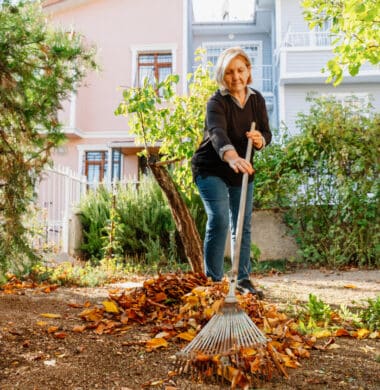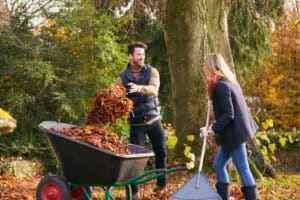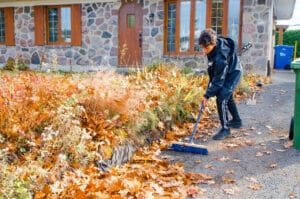Fall Yard Work Tips for People with Heart Conditions

Fall is yard work season. Whether you’re a regular green thumb or hate spending time in a garden, fall yard work is simply unavoidable. As the weather turns colder and leaves begin to fall off the trees, the mess in your yard can easily become overwhelming if you don’t stay on top of it. Raking leaves, pulling garden plants, cleaning gutters and trimming trees can be an onerous task that can potentially take multiple weekends to complete.
Many people don’t realize that fall yard work is actually very strenuous. While it can provide a sneaky source of cardiovascular exercise, it can also potentially be dangerous for individuals with heart conditions. In fact, fall yard work can even trigger a heart attack if you’re out of shape or have heart disease.
Why Does Fall Yard Work Strain Your Heart?
There are several reasons why fall yard work can strain your heart:
- Tasks such as raking leaves, clearing debris and trimming trees are considered to be aerobic exercise due to all the bending and twisting involved, and the physical demands associated with these actions will force your heart to work hard.
- Raking leaves can be even more challenging when they are wet. They become extremely heavy and as a result, this task can become as physically strenuous as shoveling snow.
- Working outdoors in cold air causes your blood vessels to become constricted and your blood pressure to rise. This places additional strain on your heart, and doing strenuous activities in these conditions can potentially trigger a cardiac event.
Tips to Reduce the Risk of Heart Problems During Fall Yard Work
Fall yard work is a rigorous workout. Just as with any other strenuous exercise, it’s important to take certain precautions to avoid triggering a heart condition, especially if you have a history of cardiovascular disease. The following tips will help make your yard work chores safer on for your heart.
Pace Yourself

- Warm up prior to doing yard work to allow your body to acclimate to the strenuous exercise it’s about to do
- Start slowly to avoid placing unnecessary strain on your heart
- Complete your yard work at a moderate pace to avoid overworking your heart
- Take frequent breaks to give your heart rate a chance to drop down to normal levels
Be on the Lookout for Warning Signs of a Cardiac Event
Listen to your body while performing yard work. It will generally let you know when you need to slow down and take a break. It will also typically let you know if you’re at elevated risk of triggering a cardiac event in the near future.
If you have a heart condition, be on the lookout for the following warning signs of a cardiac event:
- Chest pain
- Chest tightness
- Pain that goes away when you stop working and resumes when you start back up
- Shortness of breath or difficulty breathing
- Sweating
- Lightheadedness
- Fatigue
If you experience any of these symptoms, stop doing your yard work at once.
Get Evaluated by Your Doctor
If you experience the symptoms discussed above and have no history of heart conditions, you should schedule an appointment to get evaluated by your primary care doctor as soon as possible. If your doctor determines that these symptoms are potentially indicative of a larger cardiac issue, you may get referred to a cardiologist for additional diagnostic testing.
If you have heart disease or have experienced a previous cardiac event, these symptoms should trigger a greater level of concern and you should call 9-1-1 at once to request emergency medical assistance.
Have Someone Else Perform the Yard Work

Rather than shoulder this unnecessary risk, it may be better to ask a family member to do the work for you. If you don’t have a family member who can help, consider hiring someone to complete the work. Paying someone to perform this task is much better than having a heart attack because you insist on doing yard work yourself.
South Denver Cardiology Associates Can Help
South Denver Cardiology Associates offers comprehensive clinical cardiology services to help you manage and treat a wide range of heart conditions. In addition to diagnostic testing and recommending the proper treatments, our team will educate you on the lifestyle adjustments you should make to manage your heart condition more effectively. This may include having someone else complete your fall yard work for you.
In addition, you can visit our medical fitness gym to work with one of our certified exercise specialists who can help you develop a customized fitness program to improve your heart health.
Contact us today to schedule an appointment. South Denver Cardiology Associates serves patients in Denver, Littleton and the surrounding areas of Colorado.
- 9 Tips to Reduce Holiday Stress - December 11, 2025
- 6 Tips for Exercising Outdoors with a Heart Condition - May 19, 2025
- Lifestyle Changes That Can Help Manage Arrhythmia - April 30, 2025
Sign Up
As with any health concerns, your specific treatment program should be discussed thoroughly with your primary care physician as well as any specialists who may need to be consulted – like a cardiologist.
Sign Up
